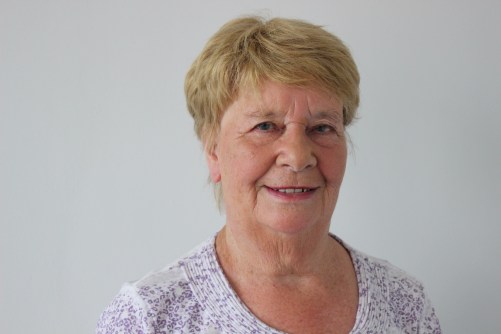Pat Dawson

Pat describes growing up as a child during the Second World War, her experience of being bombed out during a raid and then what it was like to be a teenager in the 1950s in Hull. She describes her father’s job as a ‘coal trimmer’ on Alexandra Docks and then her working life, first in clerical work, then joining the army and leaving to become a police officer.
| Media No: | 1129 |
| Interviewee Forename: | Pat |
| Interviewee Surname: | Dawson |
| Year of Birth | 1937 |
| Interviewer: | Dan Dearing |
| Location: | Hull Central Library |
| Date of Interview: | 14/06/2017 |
| Duration (HH:MM:SS): | 01:29:20 |
Time Code Notes
[00:00:23] Born Westcott Street, Holderness Road. Early memories. Experiences of going to local shops. Buying things on credit (a tab).
[00:03:07] Description of house. Who lived in the house. Terrace. Two up, two down. Front door into living room. Back kitchen. Two bedrooms upstairs. No inside hot water. Tin bath in yard. Description of tin bath routine.
[00:04:56] Getting bombed out (442 Holderness Road). Mum pregnant with eldest brother. Pat was five. Lived in rented accommodation because of blown out windows in original house. When air raid sirens went, hid in cupboard. This night they went into the shelter. Big crashes, enormous boom, covered in dust. Air raid officer told them it was their house.
[00:09:41] Further description of bombing raids. How a child felt during these times, how she felt emerging from bomb shelter to see her home destroyed. Parent’s reactions to change in the city.
[00:12:07] Other memories of bombing raids. Given masks at school. Communal shelters with rehearsals.
[00:13:22] Description of rationing, feeling of hunger from restricted diet. Types of food eaten during rationing times.
[00:16:12] What happened after being bombed. Billeting officer found a new place to rent. Description of pioneer corps who would collect items found after raids.
[00:18:52] The community during bombing raids. Bombings on Holderness Road, lots on James Reckitt Avenue. Bombing of Savoy Cinema where many died. Mum going dancing with French Officers. Children playing in bombed out houses.
[00:22:20] War was over, celebrations in Queen’s Gardens for VE Day. Lots of street parties.
[00:23:28] Experience of school. Hated school dinners. What lessons were like. Very strict, lots of tests. Gilshill Primary, Southcoates Junior and Estcourt High. Left at 15 after learning shorthand, typing and book keeping (secondary commercial school), job searching.
[00:26:45] Teenage years, description of jobs available for girls, clerical, factory jobs, shop work. Different school types, grammar, commercial, modern. 11+ exams. Unable to go to University if you couldn’t afford it.
[00:30:49] Going to work. Estate agent office on Parliament Street as an office junior. Strict working environment. Description of duties and salary. Comparison to similar jobs in the City e.g. Reckitt’s.
[00:36:00] Teenage years, social life. Going dancing at dance halls, Muriel Riley’s School of Dance to learn dances. Waltz, foxtrots then jive. Music –The Beach Boys and Everly Brothers. Descriptions of nights out at dance halls, meeting members of the opposite sex and late buses home.
[00:43:13] Joining the army, being in the Territorial Army and then joined the Women’s Army Corps. Reasons for leaving and process of leaving.
[00:48:30] Father’s profession. Worked on docks. Bad working environment. Became a coal trimmer on Alexandra Dock. Description of work required. Description of wages and other stories in relation to the docks.
[00:54:55] Money, Father didn’t save. Would spend all his wages and had to go with out at other times. Received club cheques to buy clothes with. Description of clubman system. Used them at Bladon’s on Bond Street.
[00:57:03] Shops in Hull. Carmichael’s on George Street, very posh. Trippett’s Dressmakers, Balloon Stores – cake making. Woolworths, Holderness Road. City centre market. Holderness Road, loads of butchers, bakers, grocers. Wallace’s Butchers near Southcoates Lane.
[01:06:11] Description of duties as female police officer – mainly dealt with women and children’s issues. Descriptions of other working conditions. How they got around the City. Policemen were given Noddy bikes.
[01:10:10] Bringing in of panda cars. Pat discusses the relationship between the police and public.
[01:10:50] Emotional side of being a police officer, shock of moving from the civilian side and seeing another aspect of Hull she didn’t know existed. She believes crime has increased and respect for the police is a lot less.
[01:16:32] Drug related crimes didn’t exist when she first started. Magic mushrooms but no other drugs were around. Gradual increase in drug use.
[01:18:00] How role of a police officer changed over 30 years: equal pay, police woman’s department ceased to exists, women had to do everything men did. Description of sexism encountered through the years.
[01:22:36] Reasons for leaving. Hull City Police became Humberside Police, Pat had worked for 30 years as a police officer.
[01:27:07] Pat talks about Hull City of Culture 2017.
These time code notes are provided as a rough guide to the above recording. Untold Hull would like to thank all the volunteers who took part for their time and hard work in producing this information.
